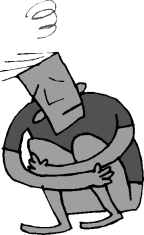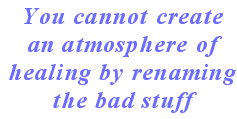“Peace, peace”
continued from Home Page
I do not think this method of counseling helps. The whimpering victim
of a broken fingernail already knows this is not a life-threatening injury,
so let her vent her frustration.  The
limper with the bad ankle knows that he will heal soon, so let him lament.
Don’t be in too much of a hurry to stifle them. (Just because
I have stopped crying doesn’t mean my discomfort has ended. It doesn’t
mean that your muffling me has helped. I stopped mainly because you wanted
me to stop.)
The
limper with the bad ankle knows that he will heal soon, so let him lament.
Don’t be in too much of a hurry to stifle them. (Just because
I have stopped crying doesn’t mean my discomfort has ended. It doesn’t
mean that your muffling me has helped. I stopped mainly because you wanted
me to stop.)
There are other ways to remove problems. According to legend, Florida got rid of all its cockroaches—there are no more cockroaches in Florida, not one. The extermination process was easy and total: they simply re-named the cockroach. Now it’s a Banana Beetle. Problem solved!
My dad claimed recently that he has never had a headache. I was puzzled at this because I recall his complaints about sinus pain which, in my opinion, is a headache. “Oh, yes,” he admitted, “I did have sinus pain, but never a headache.” Okaaay, you eliminate headaches by calling them something else.
 Many
people act as if they believe that they can create an atmosphere of healing
by renaming the “bad stuff”.
Many
people act as if they believe that they can create an atmosphere of healing
by renaming the “bad stuff”.
Here’s how it happens: A young man named Bert arrives at church on Sunday. He joins his friends over a cup of coffee after the service. “I rolled my car last night on Highway 39. Hit black ice and just lost control. Totaled it, I’m sure. And I had less that 10,000 miles on it.” To this grim announcement Tom responds, “Okay, but be thankful you’re not hurt.”
Observation #1: The truth of Tom’s statement cannot be denied. Probably part of Bert is breathing the same prayer. But the effect of Tom’s words is this: you may have destroyed your car, but as long as you are walking around talking about it—you do not have a problem. The mistake that Tom has made is that he refuses to recognize that there is indeed cause for concern, dismay, even melancholy—even though no life was lost or bodily injuries sustained.
Observation #2: Bert is feeling awful about his wrecked SUV. He loved his new vehicle. Plus he drives to work every day. He needs transportation. The quick diagnosis that calls him to be thankful (because he sustained no injuries) confuses him. “Yeah, I suppose you’re right,” he softly says to Tom, and the group of men slide into talk of other things. (As if all that matters is Bert’s intact body.)
Another sad but true story (names fictional): Maria, an elementary
school teacher, learned she had a lump in her breast. Frightened, she
called another teacher she knew to be an active church member. Maria poured
out her plight to Karena, but when Maria paused, Karena said, “But
you know you are ‘saved’, Maria.” This pronouncement
from Karena translated to, “You don’t have a problem.”
Observation: But Maria did have a problem. The prospect of surgery, chemotherapy, radiation, costs, missing work; all these things stared her in the face. She had a life threatening fight on her hands. Being “saved” did not fix all that. Thoughts of next-life serenity hardly helped her with the challenges of the here and now that she wanted to hang on to. So...sadly...Maria learned during this phone call that she could not share with Karena.
There’s nothing new about telling people they do not have a problem, even when they clearly do.
In the Old Testament book of Jeremiah, chapter 8, verse 11 we read:
They have treated the wound of my people carelessly, saying “Peace, peace,” when there is no peace. NIV
They give useless medicine for my people’s grievous wounds for they assure them all is well when that isn’t so at all! Living Bible
Shouldn’t we look on the bright side?
Why allow the person to feel the pain of their problem? Why not put a “spin” on it so the brunt of the blow is softened? It seems kind and merciful to show a hurting soul a bright side, or a positive perspective, on a seemingly negative circumstance. If a comment lifts, why not make it?
The answer to this seemingly well-intentioned attitude is that just because you walked away from your totally wrecked car does not mean you have no problem. Looking on the bright side only temporarily and partially distracts you from the true challenge of a destroyed vehicle.
There is an absence of persons who sidestep the opportunity to offer cheer, and instead reflect out loud the reality of the loss. It is a rare star who creates an atmosphere of healing by naming the “bad stuff”.
This invites the hurt ones to talk, lament, weep, groan, and feel their pain. When tears flow, things aren’t getting worse: there is actually healing that is under way. People who understand this are friends to be treasured. It is quite unlike the way we usually see people respond to the cares of the hurt ones around them. Let me repeat it again: When tears flow, things aren’t getting worse: there is actually healing that is under way.
It feels soooo good to have another human being put the truth into words, such as, “that’s really tough—to lose a valued car and nearly get smashed yourself.” or to say to Maria, “I’m so sorry to hear that. You must be really frightened.”
Our God, according to Scripture, hears our cries and is touched. Help then follows.
There is little reason for us to act differently. Let us hear people’s cries. Resist deflecting them, comparing them, or evaluating their validity.
Let us take people seriously.
God will heal them — let us not stand in the way, claiming there
is nothing to heal.
![]() Return to Care Capsule Front Page
Return to Care Capsule Front Page